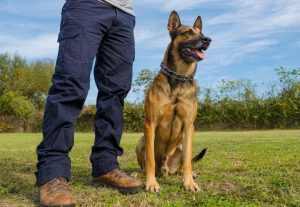What Are the Main Types of Guide Dog Trainers?
To become a guide dog trainer, one doesn’t need a degree, but many have studied animal behaviour, zoology or other related subjects. Some take courses in dog training, canine psychology or animal care. Guide dog trainers are an extremely important part of the team that helps visually impaired or blind people to get around. They are skilled individuals who train dogs to help their human companions overcome obstacles, obey commands and assist in various situations. Different levels of specialisation are now available. Here is a list of the main types of guide dog trainers out there:
- Puppy trainer: Puppy trainers, also known as puppy raisers, raise young dogs and teach them basic obedience and manners. They work with puppies from when they are born or very young until they are old enough to begin formal guide dog training.
- GDMI – guide dog mobility instructor: formal trainers who train the dogs to perform specific skills that will enable the dog to assist a blind or partially sighted person – e.g., avoid obstacles, stop at kerbs, navigate different environments – and also work with the dogs’ clients.
- Client Instructor: The instructor gives demonstrations to a blind person being paired with a guide dog, helping them learn how to handle and manage the dog. The client instructor ensures that the dog and human are bonded and that the person using a guide dog knows how to handle the animal.
- Canine Behaviour Specialist: These trainers work with aspects of canine behaviour to manage and assess healthy behaviour for use in training. They work with dogs with behavioural problems and must ensure they are suitable for guide dog work.
- Advanced Training Specialist: Prepares dogs that have completed basic training for more specific tasks, such as navigating a complex environment or working with an individual with unusual characteristics.

What Does a Guide Dog Trainer Do?
To become a guide dog trainer, you play an important part in training dogs to help people with difficulty seeing. The job involves ensuring the dog is well-mannered, dependable and capable of navigating various environments. Here is an outline of what a guide dog trainer would do.
- Teach Dogs to Avoid Obstacles: In training a guide dog, the trainers teach the dog to avoid obstacles in the handler’s path, including curbs, stairs, busy streets, uneven terrain and more.
- Basic and Advanced Obedience: guide dog trainers start with basic obedience commands (sit, stay, come) and progress to advanced tasks (crowd work, traffic awareness).
- Work on Socialisation: To become a guide dog trainer, you make sure that the guide dog is exposed to a range of situations, including busy roads, public transport and crowds, so that the dog can cope well with these environments and remain focused on the job.
- Evaluate Dog Temperament, Behaviour and Training: Throughout the training process, trainers consistently evaluate a dog so that even minor behavioural issues can be corrected or mitigated. If a dog has too many problems to overcome or is simply unsuitable for a guide dog career – perhaps it doesn’t enjoy walking or doesn’t like people – then the dog is removed from the training programme.
- Pair Dogs with Clients: To become a guide dog trainer, you pair each guide dog with a visually impaired person who can take advantage of the dog’s temperament, skills and the client’s needs. They will consider the client’s lifestyle, mobility, and personality.
- Client Training: Once the dog has been trained, the trainer works with the client to teach her how to handle the guide dog. This involves training where the client learns how to communicate with the dog, manage the dog’s behaviour, and navigate the world together.
- Ongoing Support: Trainers check in with guide-dog clients after a guide-dog team has been paired to provide them with any follow-up support they might need, such as helping to troubleshoot problems or re-training their guide dog if necessary.

Average Guide Dog Trainer Salary
In the UK, the salary of a guide dog trainer varies depending on how long they have been in the role, where they live, and who they work for. To become a guide dog trainer, you generally work for charities, which is a common model for this type of job (Guide Dogs UK is the most well-known among these). Here is an outline of typical salaries for guide dog trainers:
- Entry-Level Guide Dog Trainer: Trainers who are new to their job, like apprentices or those in training, will start their career making between £18,000 and £22,000 a year and will soon be fully trained to work with guide dogs (supervised by more experienced trainers until they get their full licence).
- Mid-Level Guide Dog Trainer: With two to three years of experience, mid-level trainers earn between £22,000 and £28,000 per year. They might work more independently and with more responsibility in the training process.
- Senior GDMI (Guide Dog Mobility Instructor): £28,000-£35,000 per annum with many years of experience. Senior GDMI trainers might become leaders, mentoring the junior trainers and taking on responsibility for training initiatives.
- Self-Employed Dog Trainer: Some dog trainers choose to work for themselves or own their dog training businesses. What they earn varies based on the demand for their services and the number of clients they work with.

Guide Dog Trainer Skills
The role of a guide dog trainer demands a combination of technical training, patience and communication skills. The person in the role needs to be able to communicate well with the dog and people, get dogs trained to a good level of obedience and guide handlers safely. Here are the key skills you need for a career as a guide dog trainer:
- Dog Handling Skills: To become a guide dog trainer, you must possess excellent dog-handling skills, which include a good knowledge of canine body language, behaviour and training techniques. The handlers must be able to work with different breeds and temperaments.
- Impatience and Impulsiveness: Impatience can make training a guide dog much more challenging. Also, if you are impulsive, following through with the work required can be difficult, especially if a dog doesn’t master a skill right away.
- Good Communication Skills: Trainers need to be able to explain or provide instructions to clients – for example, describing the actions they should use to control their guide dog and the techniques they can use when training their dog. Sometimes, trainers may need to provide feedback to clients to ensure they have a successful dog-handler partnership.
- Empathy and Compassion: You will need a good level of empathy to work with people with sight loss. Trainers will need to be understanding to work with a guide dog. 3. 3. Patience: You will need patience while working with clients over several months. The client’s experiences may also present challenges where patience is required.
- Problem-Solving Skills: You must be able to identify and resolve behavioural problems in the dogs. You must develop effective solutions to correct problem behaviour, know when to give up on a dog, and discontinue training.
- Dog Behaviour: To become a guide dog trainer, you need to know a lot about dog behaviour, such as positive reinforcement, how to modify behaviour, and what to do if something goes awry, such as fear or aggression.

Guide Dog Trainer Tips
The following are tips for budding guide dog trainers who want to make a career out of their work:
- Work With Dogs: To become a guide dog trainer, you work in a shelter or dog training class. Being around animals and learning about dog behaviour and training techniques will help you determine if a career in guide dog training is right for you.
- Consider volunteering as a Puppy Raiser: Many guide dog organisations rely on volunteer Puppy Raisers to socialise and train young dogs. This is a good way to gain experience and learn about the early stages of guide dog training.
- Build Excellent Dog Handling Skills: To become a guide dog trainer, you focus on developing your dog handling and training skills using positive reinforcement techniques. Take online or in-person dog training courses to improve your skills.
- Develop Communication Skills: The job requires trainers to work with blind people to improve their fluency and exactness of expression. Practise talking about abstract issues and giving instructions in language that can be grasped immediately.
- Follow a formal training programme: Most guide dog trainers learn their skills by following a formal training programme with a guide dog organisation such as Guide Dogs UK. These programmes are often several years long and involve hands-on experience working with guide dogs.
Guide Dog Trainer Requirements
To become a guide dog trainer, your training typically requires practical experience, formal education and on-the-job training. Here are the standard requirements for becoming a guide dog trainer in the UK:
- Education: Becoming a guide dog trainer doesn’t need a degree, but many have studied animal behaviour, zoology or other related subjects. Some take courses in dog training, canine psychology or animal care.
- Apprenticeship or training programme: Most guide dog trainers complete a formal apprenticeship or training programme working for an organisation. The programme usually takes between-on experience training guide dogs and working with clients.
- Experience with dogs: Before beginning formal training, it’s helpful to have experience working with dogs in various settings, such as a shelter, as a dog walker, or as an assistant in obedience classes.

How to Become a Guide Dog Trainer
Here’s a step-by-step guide to becoming a guide dog trainer:
- Get Hands-on Experience with Dogs: First and foremost, start by getting hands-on experience with dogs – it might mean volunteering at a local shelter, working as a dog walker, or even taking up dog training classes to hone your skills.
- Volunteer as a Puppy Raiser: Volunteering as a puppy raiser for a guide dog organisation will provide you with a strong background in training and socialising puppies.
- Graduate from a formal training programme: Apply to a formal apprenticeship or training programme with a guide dog organisation like Guide Dogs UK. This is how to become a guide dog trainer.
- Build your knowledge: Build your knowledge of canine behaviour, training skills, and positive reinforcement methods, then use that knowledge to evaluate behavioural issues and ensure the dogs you train have the appropriate skills for guide work.
- Communication skills: To become a guide dog trainer, you are required to be a good communicator with clients and co-workers. Guide-dog trainers must explain training methods and help visually impaired people.
- Continue Professional Development: Keep up to date with developments in dog training, animal behaviour and assistive technologies by attending workshops, seminars and courses. Ongoing professional development is important to stay relevant as a guide dog trainer and to provide the best training experience for dogs and clients.
Frequently Asked Questions
Why Should You Become a Guide Dog Trainer?
A career as a guide dog trainer is hugely rewarding – you’ll be able to help people with visual impairments in a very tangible way by training dogs that enable those people to be more independent, more mobile and have a dog for a company they can rely on.
Is Being a Guide Dog Trainer a Good Career Choice for You?
If you love working with animals and helping people, a career as a guide dog trainer would be an ideal fit for you. It will also require patience, compassion, strong communication skills, and the physical and emotional stamina to work with both dogs and their handlers.
Guide Dog Trainer Salaries
In the UK, guide dog trainers earn from £18,000 to £35,000 depending on experience and organisation, with the more senior trainers and those with more experience, such as Guide Dog Mobility Instructors (GDMI), closer to the top of the scale.
Which Qualifications Can Help with a Career as a Guide Dog Trainer?
While formal qualifications are optional, a level of knowledge about animal behaviour, zoology or animal care can be beneficial. Formal training with a guide dog organisation is essential for learning the skills for the job.
Do I Need Experience to Get Started as a Guide Dog Trainer?
So, while you don’t need to have worked with dogs before, most training programmes for guide dogs will expect you to have done it. It is worth volunteering to be a puppy raiser or working with animals in other situations to gain the experience needed to apply for formal training.
Guide Dog Trainer Career Outlook
They’ll continue to have to fill the demand for guide dog trainers; guide dog organisations will continue to place assistance dogs with people who are blind or low-vision. It is possible to move up the ranks to senior trainer positions, work with more specialised training programmes, or train other assistance dogs, such as hearing dogs or medical alert dogs.
Guide Dog Trainer Hierarchy and Progressing Within the Role
In most guide dog schools, trainers often enter the profession as apprentice or puppy trainers and work up to more senior positions, such as Guide Dog Mobility Instructor (GDMI). Senior trainers can direct training programmes, manage teams or mentor junior trainers. Trainers who have had considerable experience also become client instructors, where they can teach visually impaired clients how to work with their guide dogs.
Guide Dog Trainer Exit Options and Opportunities
Guide dog trainers can move on to other careers in the animal training industry, including working with service dogs for people with different disabilities, working in the veterinary field, doing animal behaviour consultation, or even working for animal welfare organisations. Some trainers may move into teaching or consultancy positions in the guide dog community or animal behaviour field.


